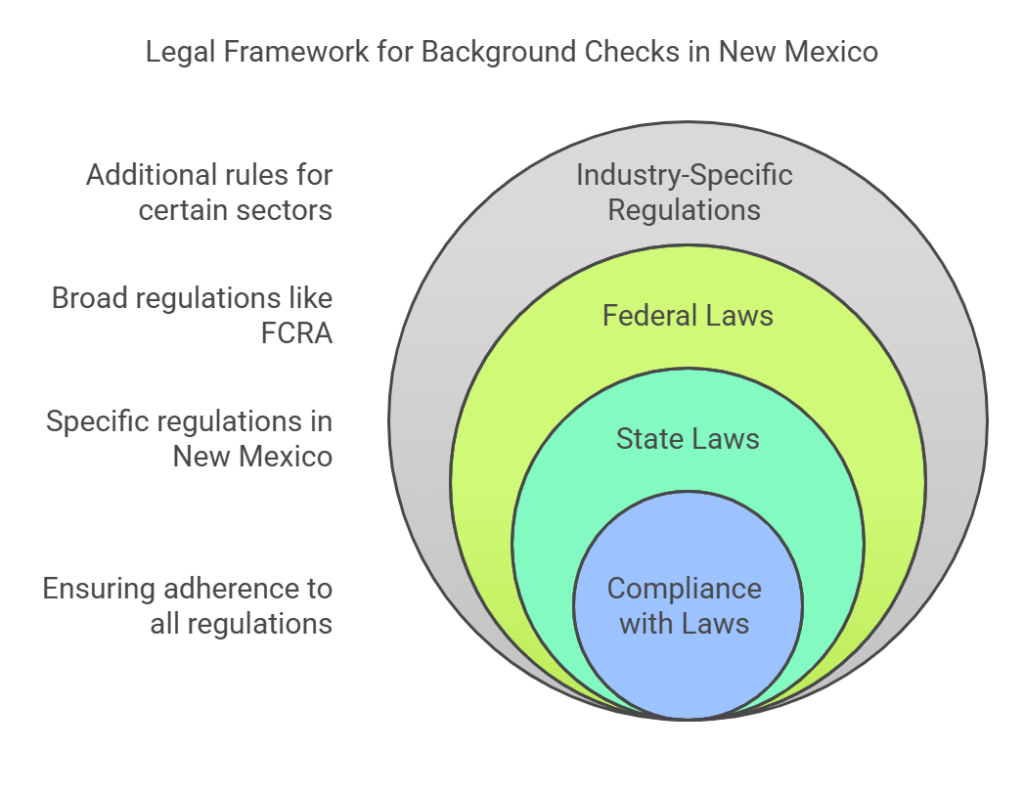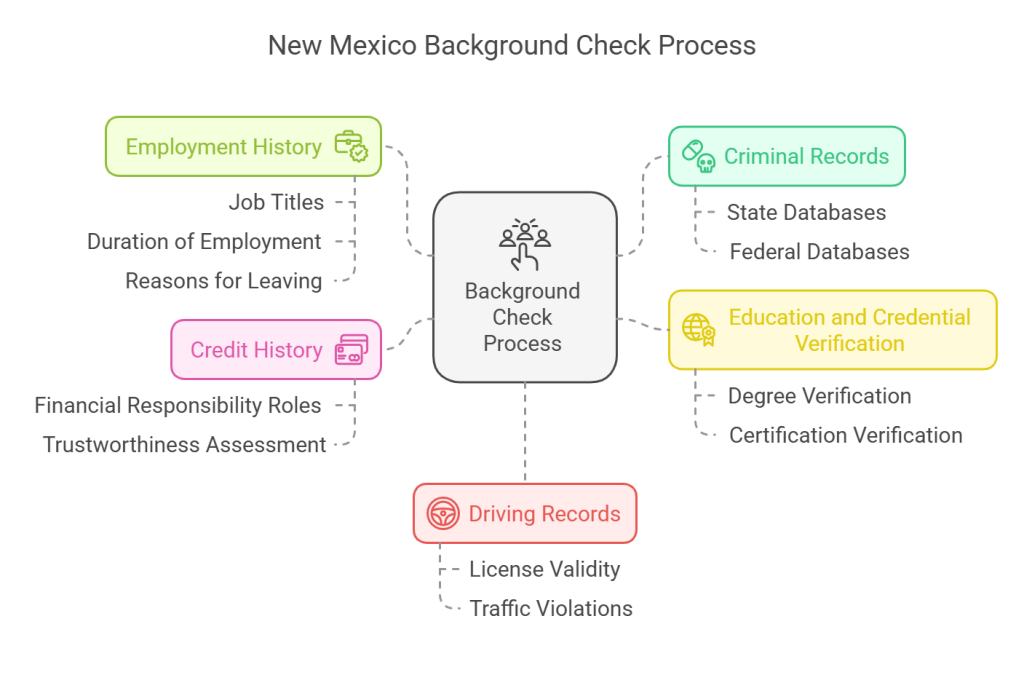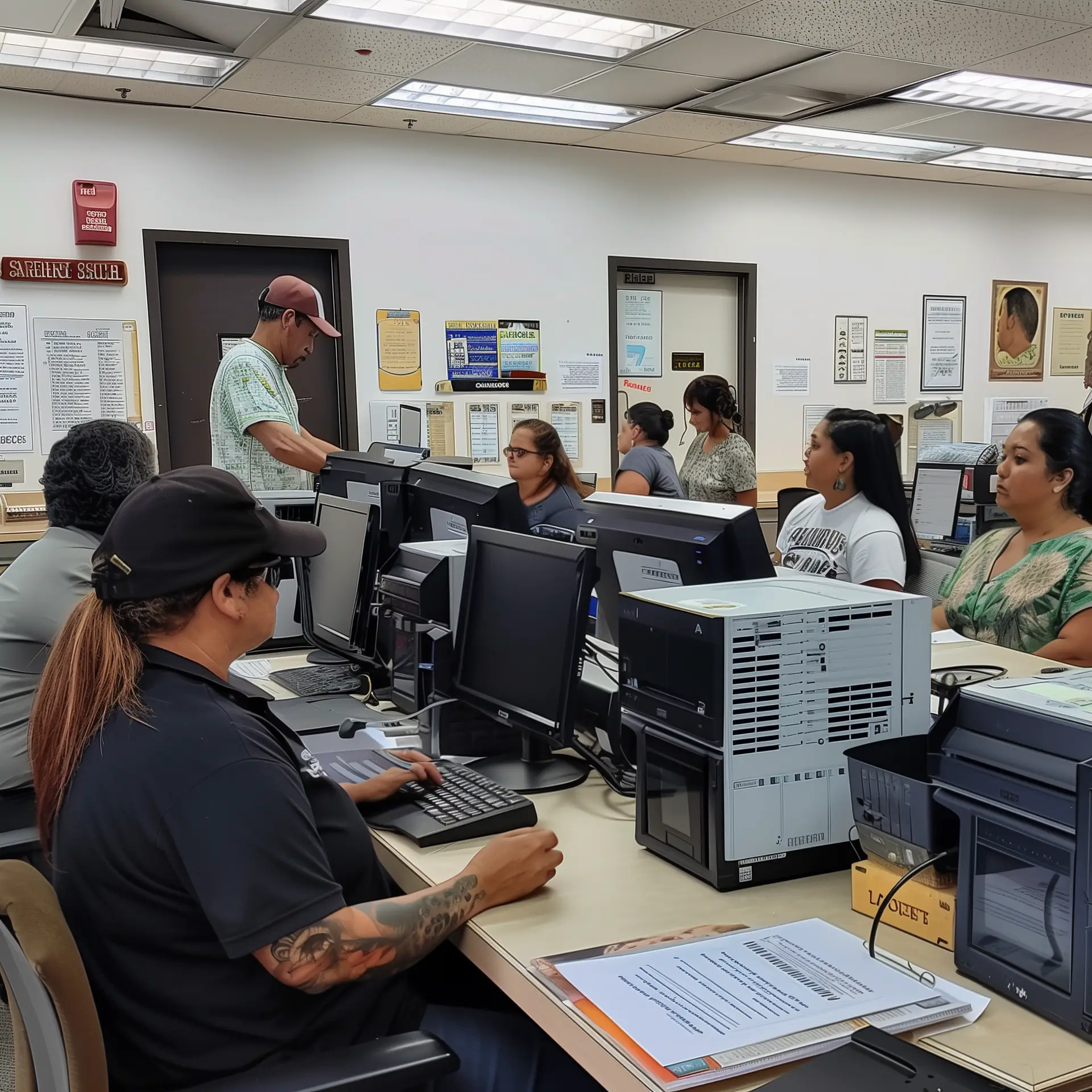Embarking on a job search or hiring process in New Mexico? You're likely to encounter the common practice of employment background checks. These checks are designed to ensure safety, reduce risks, and verify the trustworthiness of new hires. This comprehensive guide provides both employers and job seekers with essential information on New Mexico background checks.
Key Takeaways
- Employment background checks in New Mexico are vital for creating safe workplaces and informed hiring decisions by verifying candidates' integrity and qualifications.
- Understanding legal requirements, including federal and state laws like "Ban-the-Box," is essential for conducting fair and compliant background checks in New Mexico.
- Employers in New Mexico typically access criminal records, employment history, education credentials, and sometimes credit and driving records during background checks.
- Background checks in New Mexico generally cover a seven-year period, though certain jobs might require deeper investigation, especially those involving high-level responsibility.
- Job seekers can prepare for background checks by reviewing their own records, understanding their rights, and being ready to explain any past issues proactively.
Introduction
Employment background checks in New Mexico are a critical part of the hiring landscape. They serve a dual purpose: safeguarding workplaces and helping employers make informed decisions. At their core, these checks are about trust and verification—ensuring that potential hires have the integrity and qualifications they claim to possess. For employers, this means reducing the chances of fraud, minimizing liability, and fostering a safe working environment.
For job seekers, understanding these checks is crucial. They illuminate what's important to employers and how to best present oneself during the hiring process. Think of it as knowing the rules of the game—being aware of what might appear on a report allows candidates to address any issues head-on and align with employer expectations. Whether you're hiring or job hunting in New Mexico, grasping the importance and mechanics of background checks is not just beneficial—it's essential.
EXPERT INSIGHT: Shaping workplaces that value trust, safety, and inclusivity is among our duties and responsibilities as HR practitioners. Navigating the complexities of background checks in New Mexico requires more than just compliance. Why? Because it demands a thoughtful approach that balances due diligence with fairness. Working both with our hearts and minds, I believe we can establish a standard that balances the need to improve the hiring process with the necessary due diligence. - Charm Paz, CHRP
What Are the Legal Requirements for Background Checks in New Mexico?
Navigating the legal landscape for background checks in New Mexico centers around understanding both federal and state-level requirements. Federally, the Fair Credit Reporting Act (FCRA) sets the framework, mandating transparency and ensuring that background checks are conducted fairly. Employers are required to explicitly inform candidates if background checks will be carried out and must obtain written consent. In cases where the check leads to adverse employment decisions, the applicant must be notified and informed of their rights.
Complementing the FCRA are the Equal Employment Opportunity Commission (EEOC) guidelines, which stipulate that checks must not discriminate against protected classes. Employers are encouraged to evaluate applicants individually, avoiding blanket policies that could inadvertently lead to discrimination.

At the state level, New Mexico introduces its own nuances. A key piece of legislation is the "Ban-the-Box" law, which prohibits employers from inquiring about an applicant's criminal history on initial job applications. This law aims to provide ex-offenders a fair chance at employment by allowing them to showcase their qualifications first before discussing their criminal past.
New Mexico also imposes industry-specific rules. For instance, sectors like healthcare and finance have additional regulations mandating thorough checks due to the sensitive nature of roles within these fields. It's crucial for employers in such sectors to stay informed of these particular requirements to maintain compliance.
In summary, legal requirements for background checks in New Mexico are a blend of federal standards aimed at fair practices and state laws designed to level the playing field, particularly for those with criminal records. Employers need to stay abreast of these regulations to conduct checks that are both comprehensive and compliant.
What Information Can Employers Access in a New Mexico Background Check?
When employers in New Mexico run a background check, they're typically looking for specific types of information to ensure a potential employee's suitability for a role. Here's a breakdown of what is generally accessed:

- Criminal Records (State and Federal): Employers can access criminal records from both state and federal databases. This information helps identify any past legal issues, like felonies or misdemeanors, that could raise concerns about workplace safety and security.
- Employment History Verification: This involves confirming the candidate's past jobs, including titles, duration of employment, and reasons for leaving. It's crucial for assessing whether an applicant has the necessary experience and has been truthful about their work history.
- Education and Credential Verification: Employers often check educational claims to verify degrees or certifications. This step ensures that applicants have the qualifications they claim, particularly for positions requiring specific academic credentials.
- Credit History (For Specific Positions): For roles involving financial responsibility, such as accounting, employers might review an applicant's credit history. It's a way to gauge financial reliability and trustworthiness, although not every position warrants this level of scrutiny.
- Driving Records (For Relevant Jobs): If a position involves driving duties, employers will likely examine the candidate's driving record. This check confirms the validity of the driver’s license and looks for any past traffic violations or patterns of unsafe driving behavior.
Employers must navigate these checks carefully, balancing thoroughness with respect for privacy and legal constraints. Keeping the process compliant with laws like the Fair Credit Reporting Act ensures that the information accessed is both relevant and obtained lawfully.
How Far Back Do Background Checks Go in New Mexico?
When it comes to background checks in New Mexico, a standard "lookback" period is usually around seven years. This applies to criminal records, credit history, and most other information typically reviewed during these checks. However, it's essential to understand that specific factors can extend this period. For instance, roles involving a higher level of responsibility, like executive or financial positions, might justify a deeper dive into a candidate's past.

Exceptions to the seven-year rule can occur depending on factors such as the applicant's salary or position level. For instance, the Fair Credit Reporting Act (FCRA) allows for exceptions if a job pays over a certain threshold. In practical terms, this means checks might dig deeper into past records under certain circumstances.
Expunged or sealed records generally remain out of bounds during standard background checks, helping protect individuals' privacy. However, applicants should remain informed about their rights and how these records might occasionally resurface in specific legal situations or specialized background investigations. Understanding these nuances helps both employers and job seekers manage expectations and navigate the hiring process more effectively.
What Are the Steps in Conducting a New Mexico Employment Background Check?
When conducting a background check in New Mexico, laying the groundwork is crucial. Start by developing a compliant background check policy. This policy should align with legal standards, ensuring that checks are fair, transparent, and non-discriminatory. Clearly define what information is necessary for each position, considering the relevance and legality of the data you aim to gather.
Next, it's essential to obtain written consent from applicants. The Fair Credit Reporting Act (FCRA) mandates that you get explicit permission to perform a background check. This step not only keeps you compliant but also fosters transparency, reassuring candidates about the fairness of the process.
Selecting the right background check provider can make or break the process. Choose reputable providers known for accuracy, speed, and compliance. Assess their track record and ensure they respect both federal and state-specific guidelines, particularly those unique to New Mexico.
Once you’ve got the data, it’s time to review and evaluate the results. Focus on accuracy and relevance, using the information to make informed decisions. Avoid snap judgments and remember that context is key. An old misdemeanor may not be relevant to a job in accounting, for instance.
Finally, if the background check turns up something concerning, follow proper adverse action procedures. Notify the candidate, providing a copy of the report and a summary of their rights. Give them a chance to voice any concerns or correct inaccuracies, maintaining fairness throughout the hiring process.
How Much Do Background Checks Cost in New Mexico?
When looking at the cost of background checks in New Mexico, several factors can sway the final price. The complexity and depth of the check, such as whether you're just verifying employment history or delving deeper into criminal, credit, and driving records, will affect costs. Additionally, industry-specific requirements can lead to variations in pricing; for example, checks for healthcare positions might demand more thorough scrutiny due to strict regulatory needs.
On average, basic background checks can range from $20 to $50, while more comprehensive checks might cost anywhere from $100 to $200. This variability allows employers to choose a package that aligns with both their budget and hiring requirements.
Another key consideration is whether to conduct checks in-house or to outsource them to third-party providers. While in-house checks may initially appear cost-effective, they often lack the breadth and depth of those conducted by professional agencies, which also stay up-to-date with compliance laws to shield companies from potential legal pitfalls. Third-party providers, on the other hand, may carry higher upfront costs but typically offer thoroughness and precision, serving as a cost-effective choice in the long run by ensuring accuracy and legitimacy in the vetting process.
What Rights Do Job Applicants Have Regarding Background Checks in New Mexico?
Navigating the job market can be daunting, especially with background checks in the mix. If you're applying for a job in New Mexico, it's important to know your rights. First, employers must inform you if they intend to conduct a background check. This notification must be clear, separate from the job application, and typically in writing. It's not just courtesy—it's the law.
Once notified, you have the right to either consent or refuse the check. While refusing might affect your job prospects, the choice remains yours. Should you agree, and the check uncovers unfavorable information, you're entitled to review and challenge any inaccuracies. This means you can dispute incorrect data and provide proof of rectification.
New Mexico’s "Ban-the-Box" law gives an additional layer of protection by delaying criminal record inquiries until a conditional job offer is extended. This ensures you're judged first on your qualifications, keeping the application process fairer. Knowing these rights arms you with the confidence needed to navigate job applications effectively.
What Are Common Mistakes Employers Make with Background Checks in New Mexico?
Background checks are an essential part of the hiring process, but they're also a minefield of potential missteps. Here are some common errors employers might encounter in New Mexico.
Failing to Obtain Proper Consent: Overlooking the need to get clear, written consent from applicants is a straightforward path to legal trouble. This isn't just a best practice—it's a legal requirement. Without it, you could face serious violations of both federal and state laws.
Using Outdated or Inaccurate Information: Relying on old or incorrect data can lead to unfair hiring decisions. It’s crucial for employers to ensure their background check provider keeps the information up to date. Neglecting this can not only hurt the candidate but can also expose your company to legal challenges.
Applying Blanket Policies Without Individual Assessment: One-size-fits-all policies may seem efficient, but they can land you in hot water. Instead of rubber-stamping every applicant through the same criteria, evaluate each case individually. Tailoring your assessments avoids unwarranted discrimination and complies with legal guidelines.
Neglecting to Follow Adverse Action Procedures: Discovering adverse information should not be the end of the story. Employers must follow established procedures, which include notifying the applicant, providing a copy of the report, and allowing them a chance to respond. Skipping these steps can have legal repercussions and reflect poorly on your hiring approach.
By steering clear of these pitfalls, employers can not just avoid headaches but foster a fairer, more transparent hiring process.
How Can Job Seekers in New Mexico Prepare for a Background Check?
Being prepared is half the battle. Before diving into your job hunt, it's wise to anticipate the background check process and take a few steps to smooth out any potential bumps along the road.
Conducting a Self-Background Check
Start by putting yourself in an employer’s shoes. Perform a self-background check to see what they will find. This can help you catch surprises before they do. Services are available that mimic employer checks, covering your criminal history, credit report, and more. This info gives you a clear view of what your history says to potential employers.
Addressing Potential Red Flags Proactively
Found something that could raise eyebrows? Don’t panic. Strategize how to address these issues positively and proactively. If you have a past conviction, know which laws, like "ban-the-box," can offer some protection. Be prepared to talk about what you’ve learned from past mistakes and how you’ve moved forward.
Understanding Rights and Protections Under the Law
Knowledge is power—dive into your rights. In New Mexico, you have legal protections during the hiring process. Familiarize yourself with both federal and state laws, including FCRA rights, which allow you to contest errors in your record. Knowing what’s on your side can help keep stress levels down if something unusual pops up in a check.
Preparing Explanations for Negative Information
Formulating a sincere, thoughtful explanation for any blemishes is crucial. Whether it's an employment gap or a financial misstep, be upfront and honest. Craft your narrative in a way that highlights your growth and capability without dwelling excessively on the past. Employers value transparency and the steps you’ve taken to improve, so make sure your explanations reflect that.
Getting ready for a background check in New Mexico doesn’t have to be daunting. With the right preparation and mindset, you can present yourself as a confident, informed candidate ready for whatever comes next in your career.
What Are the Latest Trends and Developments in New Mexico Background Checks?
Impact of Marijuana Legalization on Drug Screening
The legalization of marijuana in New Mexico has significantly reshaped how employers approach drug screening. While federally regulated positions may still require marijuana testing, many local businesses are reconsidering its necessity. Employers are shifting toward a more flexible approach, weighing the nature of the job against the importance of testing for substances now legal at the state level.
Increased Focus on Social Media Screening
Social media screening has gained traction as part of the hiring process. Employers are exploring candidates' online personas, but it's crucial to tread carefully. Best practices involve ensuring compliance with privacy laws and maintaining ethical standards. Overstepping can lead to potential legal issues, making it a nuanced tool that requires diligent and respectful use.
Use of Artificial Intelligence in Background Checks
Artificial intelligence is carving out a role in the background check process, offering streamlined results through advanced data analysis. While AI can enhance efficiency and accuracy, it also raises concerns about biases and data interpretation. Employers need to be mindful of these issues, ensuring that AI-assisted checks complement, rather than replace, human judgment.
Potential Future Legislation Affecting Background Checks
Emerging trends suggest potential legislative changes on the horizon. Lawmakers are increasingly focused on privacy rights and data protection, which could lead to tighter restrictions on what information can be accessed and how it is used. Staying informed on legislative developments will be vital for employers to remain compliant and for job seekers to understand their rights.
Common New Mexico Background Check Questions
How far back do background checks go in New Mexico?
In New Mexico, there is no state law that limits how far back an employer can look into a candidate's criminal history during a background check. This generally means that a background check could potentially cover an individual's entire criminal history.
Are criminal records public in New Mexico?
Yes, criminal records in New Mexico are public records. However, access may be restricted for certain cases, such as those involving minors, sealed records, or expunged records. For public records, individuals can often access them through the New Mexico Department of Public Safety or the local county courthouse.
How long does a felony stay on your record in New Mexico?
A felony remains on your criminal record in New Mexico indefinitely. However, under certain circumstances, a person may be eligible to petition the court for expungement of their felony record, typically after a certain period has passed and specific conditions have been met.
Can a misdemeanor be expunged from your record in New Mexico?
Yes, certain misdemeanors can be expunged in New Mexico. The eligibility for expungement depends on factors such as the nature of the offense, the time elapsed since the conviction, and whether all court-ordered conditions have been satisfied.
What offenses cannot be expunged in New Mexico?
Certain offenses are ineligible for expungement in New Mexico, including but not limited to certain sexual offenses, violent felonies, and DWI/DUI convictions. It's essential to consult the specific New Mexico statutes or seek legal counsel to determine eligibility.
Does New Mexico offer "ban-the-box" protections?
Yes, New Mexico has "ban-the-box" laws in place that prevent employers from inquiring about a candidate's criminal history on the initial job application. This law allows applicants to be judged first on their qualifications without the immediate influence of their criminal background.
How can I obtain a copy of my criminal record in New Mexico?
To obtain a copy of your criminal record in New Mexico, you can request it through the New Mexico Department of Public Safety. This typically involves filling out a request form and providing fingerprint identification, along with paying any applicable fees.
Can juvenile records be sealed in New Mexico?
Yes, juvenile records are typically eligible to be sealed in New Mexico. Once sealed, the records are treated as though they do not exist, and the individual may legally deny the occurrence of the relevant proceedings. Specific procedures must be followed to achieve this, and eligibility requirements must be met.
Conclusion
Recapping the essentials, employment background checks in New Mexico are a key part of the hiring process, impacting both employers looking to mitigate risks and job seekers aiming to secure positions. Clarity about legal requirements, such as compliance with federal laws and understanding state-specific nuances, helps employers conduct thorough yet fair checks. Applicants, meanwhile, gain when they understand their rights, how to prepare for background checks, and the implications of various findings.
Looking ahead, the landscape of employment background checks in New Mexico will likely continue evolving. Developments like marijuana legalization and the infusion of AI technologies in screening could reshape current practices. By staying informed and adaptive, both employers and job seekers can navigate these changes optimally, ensuring that their approach to background checks remains relevant and effective in a dynamic employment market.
Additional Resources
- What Does an Employment Background Check Show?
- New Mexico Background Checks: Compliance Tips for Businesses
- Understanding the Different Types of Background Checks
- Background Checks for HR and Recruitment Agencies: The Essential Handbook
- How to Conduct Employee Background Checks for Small Businesses

GCheck Editorial Team
Meet the GCheck Editorial Team, your trusted source for insightful and up-to-date information in the world of employment background checks. Committed to delivering the latest trends, best practices, and industry insights, our team is dedicated to keeping you informed.
With a passion for ensuring accuracy, compliance, and efficiency in background screening, we are your go-to experts in the field. Stay tuned for our comprehensive articles, guides, and analysis, designed to empower businesses and individuals with the knowledge they need to make informed decisions.
At GCheck, we're here to guide you through the complexities of background checks, every step of the way.






